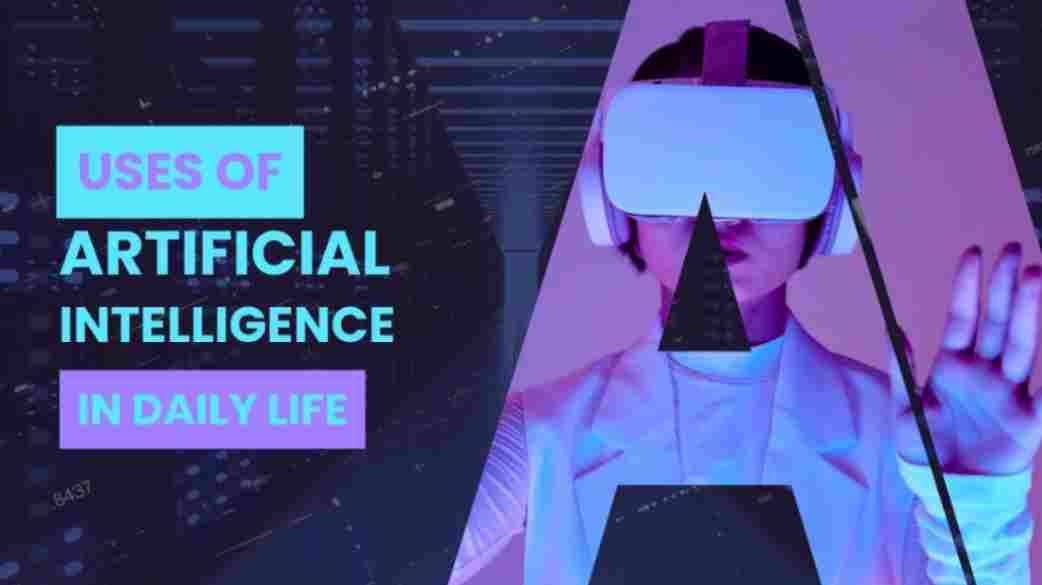Introduction: In the digital era, Artificial Intelligence (AI) is transforming the way we live and work. This article serves as a comprehensive introduction to 40 Uses Of Artificial Intelligence and AI breaking down its concepts in simple terms and exploring its practical applications.
Dive into the transformative world of AI with our beginner’s guide. Uncover the basics, explore practical applications in everyday life and business, and discover the future trends shaping AI. From personalized user experiences to advancements in healthcare and beyond, this comprehensive overview navigates the diverse landscape of AI emphasizing ethics, accessibility, and continuous learning. Unlock the potential of AI and stay informed on its dynamic evolution in various fields.
Uses of Artificial Intelligence In Daily Life Basics
1. What is Artificial Intelligence ?
AI refers to the ability of machines to imitate intelligent human behavior. It involves creating algorithms that enable computers to perform tasks such as problem-solving, language understanding, and pattern recognition.
2. Machine Learning With Uses Artificial Intelligence
A crucial subset of AI machine learning allows computers to learn from data and improve their performance over time. It’s like teaching machines to recognize patterns and make decisions without explicit programming.
Practical Applications
3. Uses of Artificial Intelligence in Everyday Life:
Explore how Artificial Intelligence is already part of our daily lives, from virtual assistants like Siri and Alexa to personalized recommendations on streaming platforms. Understand how these applications enhance convenience and efficiency.
4. Uses of artificial Intelligence in our Business:
Delve into the business realm, where AI is streamlining processes, automating tasks, and providing valuable insights through data analysis. Discover how industries are leveraging AI for enhanced productivity and strategic decision-making.
Benefits and Challenges for AI
5. Benefits Uses of artificial intelligence:
Uncover the advantages of AI, including increased efficiency, improved accuracy, and the ability to handle large-scale data analysis. Learn how AI is contributing to advancements in various fields, from healthcare to finance.
6. Challenges and Ethical Considerations:
Acknowledge the challenges associated with Artificial Intelligence, such as privacy concerns and potential job displacement. Discuss the importance of ethical AI development and the need for responsible use to mitigate risks.
The Future of AI
7. Emerging Trends on Artificial Intelligence :
Explore the latest trends shaping the future of Artificial Intelligence, including advancements in natural language processing, computer vision, and the integration of AI with other technologies. Gain insights into the evolving landscape.
AI and Personalization
8. Personalized User Experiences:
Learn how Artificial Intelligence algorithms analyze user behavior and preferences to deliver personalized experiences. This includes tailored content recommendations, targeted advertising, and personalized product suggestions, enhancing user satisfaction.
9. Uses of Artificial Intelligence in Healthcare:
Explore the role of AI in revolutionizing healthcare. From diagnostic tools that analyze medical images to predictive analytics for disease prevention, AI is contributing to more accurate diagnoses and personalized treatment plans.
Overcoming Misconceptions of Artificial Intelligence
10. Addressing Common Misconceptions:
Dispel common myths surrounding AI, such as the fear of machines surpassing human intelligence. Emphasize that AI is a tool designed to augment human capabilities, requiring ethical considerations and responsible development.
Accessibility and Inclusivity of Artificial Intelligence
11. Making Artificial Intelligence Accessible:
Discuss efforts to make AI technology more accessible to a broader audience. Highlight initiatives to ensure inclusivity, such as developing user-friendly interfaces and addressing bias in AI algorithms.
Artificial Intelligence and Creativity
12. Uses of Artificial Intelligence in Creative Fields:
Explore how AI is being used in creative industries, from generating art and music to aiding in content creation. Showcase examples of how machines are enhancing human creativity rather than replacing it.
Continuous Learning and Adaptation for Artificial Intelligence
13. Adaptive Learning With Uses of artificial Intelligence :
Highlight the concept of adaptive learning in Artificial Intelligence, where systems continuously learn and adapt to new information. This ability allows AI models to stay relevant and effective in dynamic environments.
Artificial Intelligence and Cybersecurity
14. Enhancing Security Measures Uses of Artificial Intelligence:
Explore how AI is being utilized to strengthen cybersecurity efforts. AI algorithms can detect and respond to potential threats in real-time, providing an additional layer of defense against cyberattacks.
Natural Language Processing (NLP)
15. Advancements in NLP:
Delve into the progress made in Natural Language Processing, enabling machines to understand and generate human language. Discuss applications such as chatbots, language translation, and sentiment analysis.
Artificial Intelligence in Autonomous Vehicles
16. Revolutionizing Transportation:
Examine the role of AIin autonomous vehicles. From self-driving cars to smart traffic management systems, AI is poised to revolutionize transportation, enhancing safety and efficiency.
Uses of Artificial Intelligence in Agriculture
17. Precision Farming:
Discuss how AIis contributing to precision farming by analyzing data to optimize crop yields. Explore the use of drones and sensors in agriculture, enabling farmers to make data-driven decisions for sustainable practices.
Human and Uses of Artificial Intelligence
18. Collaborative Work Environments:
Highlight the concept of human- AI collaboration in the workplace. AI tools can assist in repetitive tasks, allowing humans to focus on more complex and creative aspects of their work.
Explainability in Artificial Intelligence
19. Transparent AI Decision-Making:
Address the importance of making Artificial Intelligence systems more explainable. As Artificial Intelligence becomes integral to decision-making, the need for transparency ensures accountability and helps build trust in AI technologies.
Edge Computing and AI
20. Edge AI For Real-Time Processing:
Explore the synergy between edge computing and Artificial Intelligence. By processing data closer to the source, edge AI enables real-time decision-making, making it ideal for applications like IoT devices and robotics.
The Role Of Uses of Artificial Intelligence in Education
21. Personalized Learning Paths for AI
Discuss how Artificial Intelligence is shaping education by providing personalized learning experiences. Adaptive learning platforms can tailor content to individual students’ needs, enhancing comprehension and retention.
Continuous Uses of Artificial Intelligence in Research
22. Evolving Research Frontiers:
Emphasize the dynamic nature of AI research, with ongoing efforts to push the boundaries of what is possible. From quantum computing to neuromorphic systems, the pursuit of AI innovation is relentless.
AI Ethics and Governance
23. Establishing Ethical Frameworks:
Stress the importance of ethical considerations in AI development. Discuss the need for frameworks and guidelines to ensure responsible AI deployment and address potential biases.
Uses of Artificial Intelligence in Climate Change
24. Environmental Monitoring:
Explore how Artificial Intelligence is contributing to environmental sustainability by monitoring and analyzing climate data. AI algorithms can help identify patterns, assess environmental changes, and support efforts in climate research and conservation.
Uses of Artificial Intelligence in Virtual Reality (VR) and Augmented Reality (AR)
25. Immersive Experiences in AI :
Delve into the intersection of AI with VR and AR technologies. AI enhances immersive experiences by providing intelligent responses and adapting virtual environments based on user interactions, creating more realistic and interactive simulations.
Uses of Artificial Intelligence in Robotics:
26. Robotic Automation
Explore how AI is integrated into robotics, enabling automation in various industries. Discuss the role of AI-powered robots in manufacturing, logistics, and service sectors, streamlining processes and enhancing efficiency.
Uses of Artificial Intelligence in Retail
27. Personalized Shopping Experiences
Investigate how AI is revolutionizing the retail sector by providing personalized shopping experiences. Discuss applications such as recommendation systems, virtual try-ons, and predictive inventory management.
Uses of Artificial Intelligence And Financial Services
28. Fintech Innovations
Delve into the impact of AI on financial services, showcasing innovations in fintech. Explore how AI is used for fraud detection, credit scoring, and algorithmic trading, transforming the landscape of the financial industry.
Uses of Artificial Intelligence for Social Media
29. Content Recommendation Algorithms
Examine the role of AI in social media platforms, particularly in content recommendation algorithms. Discuss how these algorithms analyze user behavior to suggest relevant content and enhance user engagement.
Uses of Artificial Intelligence in Language Translation
30. Breaking Language Barriers
Explore the advancements in Artificial Intelligence-driven language translation technologies. Discuss how machine translation algorithms are breaking language barriers and facilitating global communication.
Uses of Artificial Intelligence in Sports Analytics
31. Enhancing Performance Analysis
Investigate how Artificial Intelligence is utilized in sports analytics to enhance performance analysis. Discuss applications such as player tracking, injury prediction, and game strategy optimization.
Uses of Artificial Intelligence and Mental Health
32. Emotional Intelligence Applications
Explore how AI is being applied in the field of mental health. Discuss AI applications that analyze speech patterns and facial expressions to assess emotional well-being and provide support.
Uses of Artificial Intelligence in Disaster Response
33. Predictive Analytics for Disaster Preparedness
Discuss how Artificial Intelligence is used in predictive analytics to enhance disaster preparedness and response. Explore applications such as early warning systems and resource allocation optimization.
Uses of Artificial Intelligence and Space Exploration
34. Autonomous Spacecraft and Exploration
Delve into the role of AI in space exploration. Discuss how autonomous spacecraft and AI-driven systems are advancing our capabilities in studying the cosmos.
Uses of Artificial Intelligence in Law and Legal Tech
35. Legal Research and Document Analysis
Explore how Artificial Intelligence is transforming the legal industry through applications in legal research and document analysis. Discuss the efficiency gains and advancements in legal tech.
Uses of Artificial Intelligence and Gaming
36. Intelligent Gaming Environments
Investigate the integration of AI in gaming environments. Discuss how AI enhances gaming experiences through adaptive gameplay, intelligent NPCs, and procedural content generation.
Uses of Artificial Intelligence in Construction and Engineering
37. Project Management and Optimization
Explore how Artificial Intelligence is applied in construction and engineering for project management and optimization. Discuss applications such as predictive maintenance and smart construction.
Uses of Artificial Intelligence and 3D Printing
38. Smart Manufacturing with AI
Delve into the synergy between AI and 3D printing in smart manufacturing. Discuss how AI is used to optimize 3D printing processes and improve manufacturing efficiency.
Uses of Artificial Intelligence and the Aging Population
39. Assistive Technologies for Seniors
Explore how Artificial Intelligence is contributing to the development of assistive technologies for seniors. Discuss applications such as health monitoring, fall detection, and social companionship.
Uses of Artificial Intelligence in Political Analysis
40. Analyzing Political Trends
Investigate how AI is applied in political analysis to analyze trends, predict outcomes, and provide insights into political landscapes.
In conclusion,
This expanded guide not only covers the fundamental aspects of Artificial Intelligence but also delves into specialized areas, showcasing the diverse applications and impact of AI across industries. From robotics and retail to mental health and space exploration, AI continues to shape and redefine various aspects of our lives and society. As we navigate the ever-expanding landscape of AI, it becomes increasingly crucial to stay informed about the latest developments across diverse domains and consider the ethical implications and responsible use of this transformative technology.
This comprehensive guide has unveiled the multifaceted realm of Artificial Intelligence (AI), guiding beginners through its fundamental concepts, practical applications, benefits, challenges, and diverse future trends. From everyday conveniences to revolutionary transformations in healthcare, agriculture, and transportation, AI’s impact is vast and continuously evolving. The exploration of personalization, creativity, cybersecurity, and collaborations between humans and AI highlights the breadth of AI’s influence across various sectors. As we navigate the dynamic landscape of AI, it is crucial to address misconceptions, prioritize accessibility, adhere to ethical considerations, and foster continuous learning. The article underscores the pivotal role AI plays in shaping our present and future, emphasizing the need for responsible development, transparency, and ethical governance in the ever-expanding domain of Artificial Intelligence.


3 thoughts on “40 Uses Of Artificial Intelligence In Daily Life With Examples”